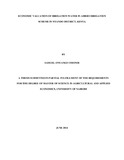Economic Valuation Of Irrigation Water In Ahero Irrigation Scheme In Nyando District, Kenya

View/
Date
2014-06Author
Omondi, Samuel O
Type
ThesisLanguage
enMetadata
Show full item recordAbstract
Water is an important input in most economic sectors hence necessary for economic development. However, water scarcity is on the increase due to human population growth, expansion of cities and rise in demand for water in agriculture and other sectors. Water utilization is highest in agriculture compared to other sectors of the economy. The most significant problem in agriculture is the intense use and low efficiency of water. To reduce the inefficiency and intense use, water must be treated as an economic good and more efficient prices be introduced. This requires estimation of the economic value of water and assessment of factors affecting farmers Willingness to Pay (WTP) for irrigation water.
The purpose of the study was to estimate the economic value of irrigation water in Ahero Irrigation Scheme. The specific objectives were: to estimate the economic value of irrigation water among smallholder rice farmers in Ahero Irrigation Scheme; to assess the factors influencing farmers‟ WTP for irrigation water in Ahero Irrigation Scheme; to determine whether irrigation water is a significant input in rice production in Ahero Irrigation Scheme.
Both Contingent Valuation Method (CVM) and Residual Value Method (RVM) were used to estimate the economic value of irrigation water while the Ordinary Least Square (OLS) was used to assess the factors influencing farmers‟ WTP for irrigation water. A production function was estimated to determine which factors influence rice output and whether water is a significant input in rice production. CVM was found to undervalue irrigation water, hence the economic value of irrigation water was estimated to be Ksh.7.54/m3, based on the RVM results. Participation in off-farm income generating activities, access to credit and satisfaction with the management of water supply positively influence farmers‟ WTP for irrigation water at 1%, 10% and 1% levels of significance respectively. Volume of irrigation water was significant at 10%
level in determining rice yields in Ahero Irrigation Scheme, Nyando District, Kenya. Quantity of fertilizer and labour were also found to influence rice output positively at 10% level.
Irrigation water at Ahero Irrigation Scheme should be charged at appropriate price relative to its economic value of Ksh.7.54/m3 to avoid its wasteful use. The findings of this study further reveal that irrigation water is a significant input in rice production and therefore its supply and management should be improved to ensure adequate amount of water during rice production periods. Smallholder farmers should also be encouraged to take credit and participate in Small and Medium Enterprises in order to improve off-farm income which consequently increases their WTP for irrigation water.
Citation
Degree Of Master Of Science In Agricultural And Applied Economics,2014Publisher
University Of Nairobi
